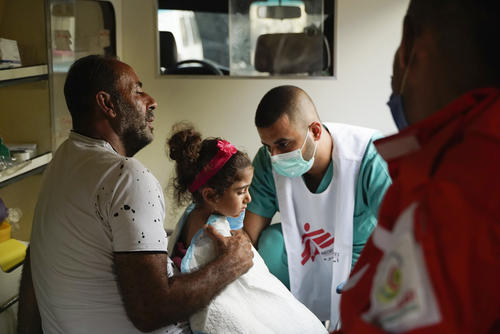Afghanistan: New MSF report details scale of stark healthcare crisis
A dysfunctional healthcare system, widespread poverty, and increased restrictions placed on women are at the heart of the current humanitarian crisis in Afghanistan.
This is according to a new report published by Médecins Sans Frontières / Doctors Without Borders (MSF).
The report calls for policymakers, donor organisations and local authorities to urgently focus on strengthening everyday medical services to improve people’s access to healthcare in Afghanistan.
International organisations must also address the issues contributing to the economic crisis.
And, women must be allowed to pursue further education and employment opportunities, raise income for their families and to ensure there are enough female health workers to meet the country's needs.
In this latest report from MSF, Persistent barriers to access healthcare in Afghanistan, over 91 percent of people surveyed told of a decrease in their income last year, which is 15 percent more than in 2021.
A staggering 95 percent of people also said they had faced difficulties in affording food over the past 12 months – primarily as a result of rising unemployment and stagnant salaries accompanied by increasing prices, especially for basic food items.
This comes as the sanctions imposed by the international community continue to cripple the economy and US$7 billion of the Afghan central bank’s assets remain frozen abroad.
A complex emergency
“Sometimes mothers are so malnourished they can’t produce milk for their children,” says Hadia*, a member of MSF’s medical staff at Herat Regional Hospital.
“We see them putting tea in bottles to give to newborn babies of only seven or eight days, which can be very dangerous.”
Many Afghans have been forced to adopt negative coping mechanisms amid this difficult economic situation. Among people surveyed in the report, 88 percent said they either delayed, suspended or decided not to seek medical care in 2022, an increase of more than 14 percent from the year before.
Marieh, after arriving at the MSF-supported Herat Regional Hospital, explained:
"When my child was sick, we went to one of the private clinics and received a prescription for drugs that cost 1,000 AFG [around £10]. They didn’t help. We also tried a nearby public hospital, but doctors there gave us only half a tablet, not all the medication that we needed.
“Now we’re here. My baby is worse, and I owe a lot of money we borrowed for transport.”

Get closer to the Frontline
Get the latest news, stories and updates, straight to your inbox.
“One of the main problems in Afghanistan is that peripheral health facilities are neither well-equipped, adequately resourced nor properly staffed,” says Filipe Ribeiro, MSF’s country representative in Afghanistan.
“This means people in rural areas need to travel vast distances for quality treatment, even though they often cannot afford such journeys without plunging themselves into debt.
“Hopes that the end of the war would significantly reduce obstacles to accessing healthcare were dashed by new barriers and fears. The journey to hospitals may be less dangerous after the war, but it certainly became more difficult to afford.”
Barriers to women
More than 60 percent of people said women already face more significant obstacles when trying to access healthcare in comparison to men – mostly in terms of movement restrictions related to the long-standing socio-cultural practice known as the ‘mahram’.
This requirement obliges women leaving home to be accompanied by a male relative. It can impede their ability to reach a hospital whether as patients, caregivers or humanitarian workers.
For example, this could happen when no male relative is available to accompany them, or when a journey which is already hard to afford for one person becomes unaffordable when paying for two.
In December 2022, the government of Afghanistan announced its decision to ban women from employment in non-governmental organisations and from university-level education. This will likely worsen women’s access to healthcare.
“It is already difficult in some of our projects to fill the necessary positions, including gynaecologists,” says Filipe.
“If women are not allowed to study, where will the next generation of doctors, midwives and nurses come from?
“MSF teams in our maternity projects across Afghanistan assisted more than 42,000 deliveries last year and over 8,000 of them were accompanied by direct obstetric complications. Prohibiting women from learning and working will put the lives of mothers, and the lives of their children, at a greater risk.”
*The names of Afghan people quoted in the article have been changed to protect their identity
MSF in Afghanistan
Our teams continued to provide medical aid throughout the crisis following Afghanistan's change of government in 2021. We treated emergency trauma cases, supported people with chronic conditions and worked to welcome new life with vital maternity services.


